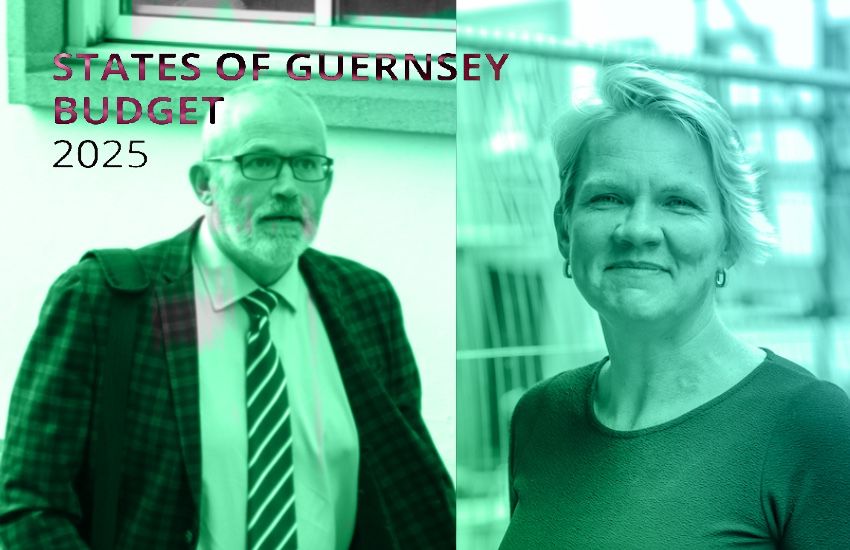


Deputies have worked with Treasury staff to compare the longer term impact of three Budget tax options.
The research was prompted by Deputies Sasha Kazantseva-Miller and David Mahoney, both who have been involved in amendments ahead of next week's debate.
They wanted detailed analysis of what income tax based packages would look like to 2031 compared to GST-led proposals.

Pictured: Deputies David Mahoney and Sasha Kazantseva-miller say the figures broken down, detail which portions of the population will be most impacted by the changes.
You can find a round up on all of the 19 amendments lodged for the budget debate next week here.
- 1. Income tax continuing at 22% with the agreed increases to Social Security contributions to 2031
- 2. Income tax continuing at 22% with a restructure of Social Security contributions from 2027
- 3. GST+ package from 2027 with thresholds and other elements adjusted for inflation, including the 15% tax band, higher personal allowances and Social Security contributions restructure
All three scenarios accounted for revenue from the corporate sector expected from Pillar 2 Income.
The outcome of the analysis shows a “clear” path forward according to Deputy Kazantseva-Miller, who said: “This data brings into stark focus, the negative impact an income tax led strategy would have on households even with some mitigation measures achieved through a Social Security contribution restructure”.
It shows that option one would hit those in the 25th to 29th percentile the most, the example given is a household with two adults making around £40,000 per month. Under the second option, the weight of the decision will hit those in the 40th to 45th Percentile, while the third option, "GST+", will see households worse-off from the 75th - 79th percentile. Essentially the figures suggest the responsibility shifts, and who will bear the weight of extra costs changes dependent on which option is chosen by Guernsey’s elected officials. Those who have little, or those who have much more.
A statement from the team behind the research states: “The reason for the difference is the quantum of mitigation measures that are possible under a GST+ package equivalent to £43million, which is not achievable under any scenario built on income based taxes. In addition, GST further diversifies the tax-base by generating income from new sources including visitors and a new exemption fee on finance companies.”
The result is some strong words from Deputy Kazantseva-Miller.
“Given the high cost of living and doing business in Guernsey, this data helps to show more clearly, that an income tax led strategy is a precarious option with the potential for highly detrimental economic impact both in the short and long-term. The risk that this tax strategy could be in play until 2029, if the Budget measures are approved unamended, is of serious concern”.
Deputy Mahoney said that income tax increases are essentially a short term solution which could create a long term problem.
“While the rationale for bringing forward the income tax increases in this Budget is to serve as an immediate but short-term revenue-generating measure, we must be cognisant of the high risk that such measures could be in play until 2029. We hope that this most recent data helps to further inform the debate on the most appropriate tax reform for Guernsey going forward and the timing around when such decisions have to be made.”

Pictured: Deputies will take to the States chamber to debate the Budget on Tuesday.
Deputy Kazantseva-Miller has proposed Amendment 12, which looks to increase the money made by the Guernsey Registry, and has seconded Amendment 18. That was proposed by Deputy Sam Haskins and looks to pause the “down-sizing” scheme initiated by the States in November 2022.
Meanwhile Deputy Mahoney seconded Amendment 3, which was proposed by Deputy Mark Helyar. It looks to cut public spending and halt a proposed £40m increase. He’ has also thrown his name behind Deputy Haskins' drive to tweak the proposed Rent-a-Room initiative.
You can find details of the major GST bid by Deputies Peter Roffey and Peter Ferbrache here; a big cut to public spending being proposed by Deputies Mark Helyer and David Mahoney here; and opening up temporary housing villages to local residents here.
Comments
Comments on this story express the views of the commentator only, not Bailiwick Publishing. We are unable to guarantee the accuracy of any of those comments.